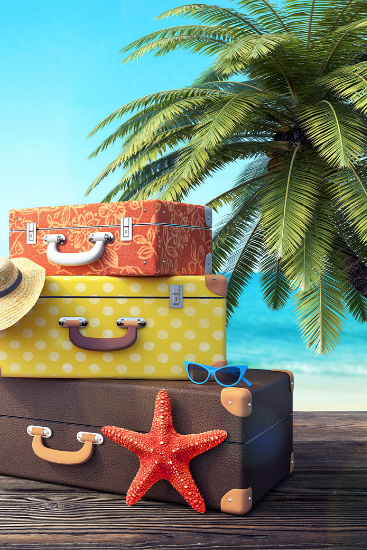[Travel increases your chance of getting and spreading COVID-19. CDC recommends that you do not travel at this time. Delay travel and stay home to protect yourself and others from COVID-19. Visit CDC’s Travel During COVID-19 for more information and steps to take if you must travel.]
As spring approaches, many spring breakers will be looking forward to sunny destinations and a long week of relaxation. Some may travel to tropical hot spots, like Cancun or islands in the Caribbean, while others may opt for bustling cities, like Amsterdam or Bangkok. Not all spring break destinations are created equal: Some have specific health risks you should be aware of.
Wherever your travels take you this spring break, stay healthy and safe with these tips from CDC Travelers’ Health.
Before You Go
- Find out what vaccines, medicines, or advice is needed for your destination and plan a visit with your doctor or a travel medicine specialist at least 1 month before you leave the United States.
- Get your flu shot at least 2 weeks before you travel, as it can take up to 2 weeks to be fully protected. Also, stay clear of people who are coughing or otherwise appear to be ill, and wash your hands often with soap and water.
- Make sure you are up-to-date on the MMR (measles, mumps, and rubella) vaccine. There are outbreaks of measles in popular destinations.
- Talk to your doctor about the hepatitis A and hepatitis B vaccines.
Other items to add to your to-do list:
- Find out if your health insurance covers medical care abroad—many plans don’t! Consider additional insurance that covers health care and emergency evacuation, especially if you will be traveling to remote areas.
- Pack smart and prepare a travel health kit with the items you may need on your trip, including prescription and over-the-counter medicines, insect repellent, sunscreen, alcohol-based hand sanitizer, and condoms.
- Check the US Department of State website for information on security risks. Register with the Smart Traveler Enrollment Program so the US embassy or consulate can contact you in case of an emergency.
During Your Trip
Don’t leave your healthy habits at home—“what happens on spring break stays on spring break” may imply that taking risks is expected, but you should always play it safe when it comes to your health.
- Road safety. Motor vehicle crashes are the leading cause of death among healthy travelers. Choose safe transportation. Always wear a seat belt, and ride only in marked taxis or ride-sharing vehicles. Be alert when crossing the street, especially in countries where people drive on the left.
- Prevent insect bites. Use insect repellent to protect against diseases spread by mosquitoes, such as Zika, dengue, and malaria. Always apply after your SPF 15+.
- Wear sunscreen with SPF 15 or higher when outdoors. Remember that sun protection isn’t just for tropical beaches—you can get a sunburn even if it’s cloudy or cold!
- Be safe on tours. Use a reputable travel guide or tour company if you plan on doing any adventure travel activities like reef diving, surfing, or zip-lining.
- Be careful when indulging in the local cuisine. In developing countries, eat only food that has been fully cooked and served hot. Only eat fresh vegetables or fruits if you can peel them yourself. Drink only bottled, sealed beverages, and steer clear of ice—it was probably made with tap water.
- Norovirus. Cruise ship outbreaks of vomiting and diarrhea, primarily caused by norovirus, have been reported. Don’t let this virus ruin your trip. The best ways to prevent illness are frequent handwashing with soap and water, and practicing safe eating and drinking habits while on off-boat excursions.
- If you get sick or injured and need immediate medical attention while you’re on your trip, contact the US embassy or consulate in your destination; they can help you locate medical services in your area as well as notify friends, family, or your employer in case of an emergency. For more information, see Getting Health Care Abroad.
After You Return
If you’re not feeling well after your trip, call your doctor and tell them where you have traveled, including where you went and what you did on your trip. You may have picked up a virus or other infection during your trip, even though you did not have symptoms until you returned. Telling your doctor where you have been will help your doctor consider infections that are rarely found in the United States. If you need help finding a travel medicine specialist, find a clinic here.


